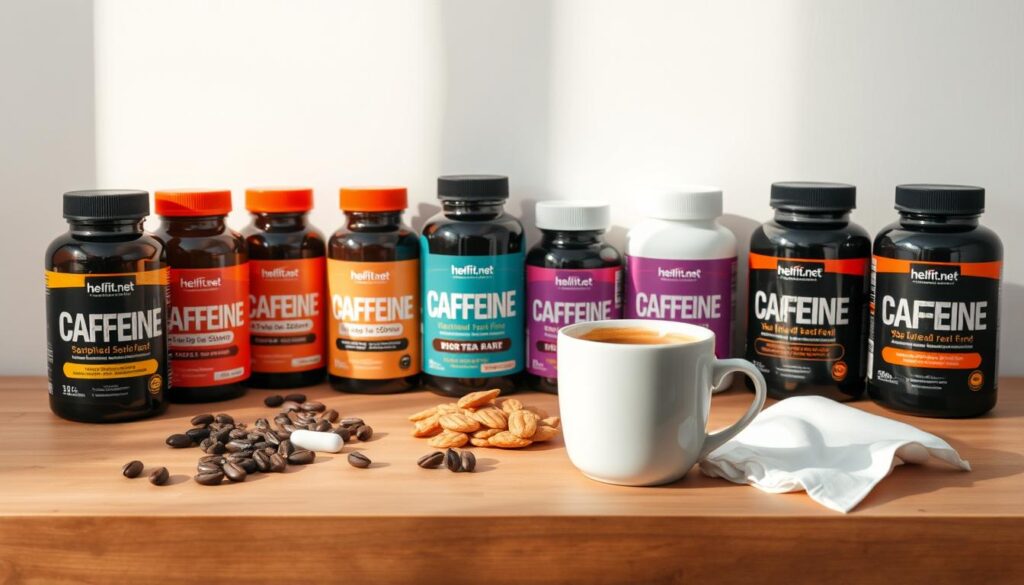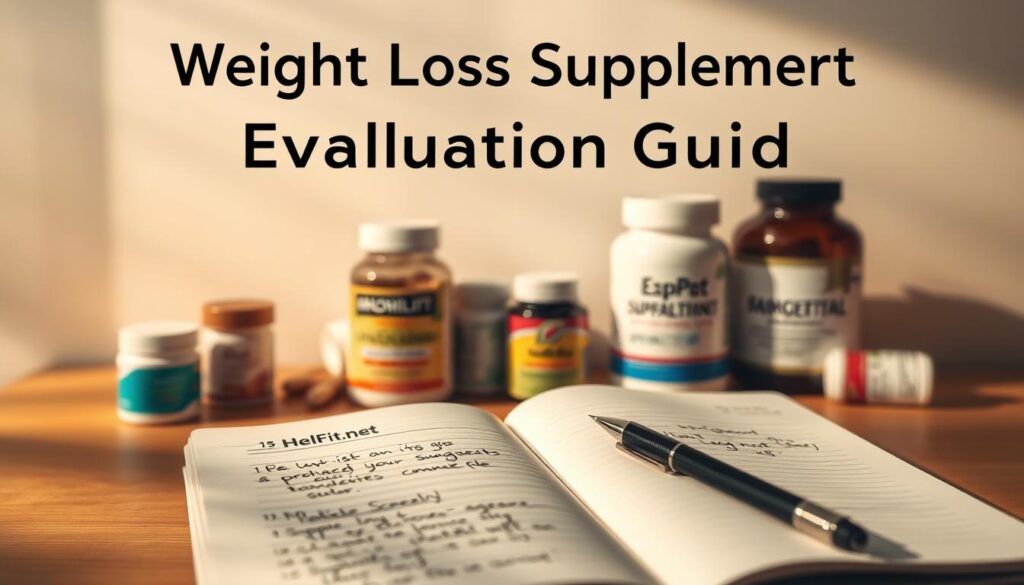Exploring weight loss supplements can be overwhelming. It’s like navigating a maze of promises and risks. I’ve researched many products and aim to share the truth about weight loss supplements that really work.
Weight loss supplements come in many forms, like capsules and powders. Each one promises to help you lose weight. This guide will help you figure out which supplements might actually help you reach your health goals and which are just marketing tricks.
The supplement market is full of complexity. With so many products promising quick fixes, it’s important to be cautious and understand the science behind them. My goal is to make these products clearer and share evidence-based insights on what actually works.
Key Takeaways
- Not all weight loss supplements are created equal
- Scientific evidence varies dramatically between different supplements
- Supplements should complement, not replace, a healthy diet and exercise
- Always consult healthcare professionals before starting any supplement regimen
- Individual results can differ significantly
Understanding Weight Loss Supplements
Exploring weight loss supplements can be tough. I’ve done a lot of research on these products. I’ll explain what they are, how they work, and what to know before picking the best ones.
Weight loss supplements are dietary products that help with weight management. They are not magic solutions but can be helpful in a weight loss plan. You can find them in pills, powders, and extracts.
What Defines a Weight Loss Supplement?
These products have ingredients that help with weight loss in different ways:
- Metabolism boosters
- Appetite suppressants
- Fat blockers
- Energy enhancers
Common Ingredients Explored
Many top weight loss supplements have ingredients backed by science. Let’s look at some popular ones:
| Ingredient | Potential Benefits | Clinical Evidence |
|---|---|---|
| Raspberry Ketone | Fat metabolism support | Clinical trial showed 4.2 pounds average weight loss in 8 weeks |
| Green Tea Extract | Metabolism enhancement | Moderate evidence of weight loss support |
| L-Carnitine | Energy production | Safe dosage up to 2,000 mg per day |
Integrating Supplements into Your Diet
Natural weight loss supplements should add to a healthy diet and exercise, not replace them. They work best when you also eat well and stay active.
- Balanced nutrition
- Regular physical activity
- Consistent lifestyle changes
Remember: No supplement can substitute for healthy eating and exercise.
Always talk to a healthcare professional before starting any supplement. This is very important if you have health issues.
The Science Behind Weight Loss Supplements
Exploring weight loss supplements needs a careful look and a grasp of science. About 15% of U.S. adults have tried these supplements. It’s key to know how they affect our metabolism and health.
Metabolism and Supplement Interactions
Weight loss supplements try to change our metabolism in different ways. Good supplements focus on important metabolic steps:
- Increasing fat burning rates
- Suppressing appetite
- Boosting energy expenditure
- Regulating blood sugar levels
Evidence-Based Benefits
Studies show some supplements might help. Weight loss supplement reviews point out a few good ones:
- Green tea extract: May help with weight loss
- Caffeine: Could stop weight gain
- Berberine: Has shown to help with weight loss in many studies
- Probiotics: Might help reduce body weight and fat
Potential Risks and Safety Concerns
Even with benefits, it’s important to be careful. The FDA doesn’t check supplements before they hit the market. This means doing your own research is vital. Possible dangers include:
- Liver damage from high-dose green tea extracts
- Cardiovascular side effects from caffeine
- Interactions with existing medications
- Possible allergic reactions
Always talk to a healthcare professional before starting any new supplement.
Popular Types of Weight Loss Supplements
Finding the right Top Weight Loss Supplements can be tough. Weight Loss Pills offer different benefits for those trying to lose weight. Let’s look at the most common types and what they might do for you.

I’ll explain the most popular weight loss supplement categories. This will help you choose wisely for your health and fitness goals.
Fat Burners: Boosting Metabolism Naturally
Fat burners aim to boost your metabolism and burn fat. Caffeine is a key ingredient in many. Studies show caffeine can:
- Boost energy
- Speed up metabolism
- Help burn more calories
Appetite Suppressants: Controlling Hunger
These Weight Loss Pills help you eat less by reducing hunger. Ingredients like:
- Glucomannan (a natural fiber)
- Green tea extract
- Chromium supplements
Carb Blockers and Metabolic Regulators
Carb blockers stop carbs from being absorbed. Chromium is used to help control blood sugar and curb carb cravings.
| Supplement Type | Key Benefits | Potential Risks |
|---|---|---|
| Fat Burners | Metabolism boost | Possible anxiety, jitters |
| Appetite Suppressants | Reduced hunger | Potential digestive issues |
| Carb Blockers | Reduced carb absorption | Potential nutrient interference |
Meal Replacement Products
These supplements offer a quick, easy meal option. They provide controlled calories and balanced nutrition. They come in shakes or bars, perfect for those losing weight.
Important Note: Always consult with a healthcare professional before starting any new supplement regimen.
The Role of Caffeine in Weight Loss

In my ultimate guide to weight loss supplements, I’ll explore the world of caffeine. It’s a key player in many weight loss products. It offers benefits that catch the eye of those looking to manage their weight.
Benefits of Caffeine for Weight Loss
Caffeine can change the game for your weight loss journey. Studies show some amazing facts:
- Increases resting metabolic rate by 3–11%
- Boosts fat burning up to 29% in lean individuals
- Improves exercise performance by 11–12%
- Contains only two calories per cup of black coffee
Risks and Tolerance Issues
While caffeine has its benefits, it also has downsides. The FDA says up to 400 milligrams daily is safe for most adults. Caffeine tolerance can develop over time, which might lessen its effects.
Suggested approach: Two weeks of consumption followed by two weeks off to maintain effectiveness.
For those looking into weight loss supplements, caffeine is a complex tool. It’s wise to use it thoughtfully, knowing how it affects you and its limits.
- Monitor your body’s reaction
- Stay within recommended daily limits
- Consider genetic variations in caffeine metabolism
- Be aware of possible side effects like jitteriness
Understanding caffeine’s role in weight management helps you make smart choices. It’s a key part of a healthy lifestyle.
Natural vs. Synthetic Supplements

Choosing between natural and synthetic weight loss supplements can be tough. It’s important to know the differences to make the best choice for your health.
Natural supplements have big advantages over synthetic ones. They come from whole foods, making them easier for your body to use and giving you more nutrients.
Key Differences Between Supplement Types
- Origin: Natural supplements come from whole food sources, while synthetic versions are chemically manufactured
- Nutrient Absorption: Organic vitamins are more easily absorbed by the body
- Concentration: Synthetic supplements often contain higher nutrient amounts to compensate for lower absorption rates
Effectiveness Comparison
Research shows how effective weight loss supplements can be. Most vitamin C supplements are made synthetically, from corn syrup or coal tar. Natural supplements offer a more complete nutritional package.
Even though synthetic supplements might seem cheaper, they can be risky. High doses of isolated synthetic nutrients can lead to health problems, like cancer and digestive issues.
Making the Right Choice
When picking supplements, think about these things:
- Check ingredient sources
- Consult healthcare professionals
- Review scientific research
- Monitor your body’s response
Your supplement choice should match your health goals and nutritional needs. Natural supplements often offer a better way to support your wellness journey.
The Importance of a Balanced Diet

When looking for the best weight loss supplements, remember that they’re not magic. They’re tools to help with a healthy lifestyle. A balanced diet is key to losing weight.
Supplements can help, but they can’t replace real, nutritious foods. These foods give you the vitamins, minerals, and energy you need.
Why Whole Foods Matter
Nutrition experts say eating a variety of foods is best for health. Here are some important tips:
- Eat at least 5 portions of fruits and vegetables daily
- Include starchy foods in moderation
- Consume 2 portions of fish weekly
- Limit saturated fats and added sugars
Nutrient-Rich Foods for Weight Loss
Choose foods that are good for weight loss and full of nutrients:
- Lean proteins (chicken, fish, tofu)
- Whole grains
- Fresh vegetables
- Fruits with high fiber content
Focus on whole foods and use supplements wisely. This way, you’ll have a healthy way to manage your weight and reach your health goals.
Evaluating Claims: What to Look For
Finding the right weight loss supplements can be tough. I’ve looked into many effective ones. I’ll show you how to check product claims and make smart choices.

When looking at weight loss supplements, pay attention to these important points:
- Check for scientific research backing the product
- Verify ingredient transparency on labels
- Look for third-party testing certifications
- Read unbiased customer Weight Loss Supplement Reviews
Understanding Product Labels
Product labels can be tricky. Here’s how to read them:
- Examine the full ingredient list carefully
- Check recommended dosages
- Identify possible allergens
- Verify manufacturer credentials
Researching Supplement Claims
Not all weight loss supplements are the same. Use trusted sources like the National Institutes of Health (NIH) PubMed database to check claims.
| Verification Method | Reliability Rating |
|---|---|
| Peer-reviewed scientific studies | High |
| FDA notifications | Medium |
| Consumer testimonials | Low |
Pro tip: Always talk to a healthcare professional before starting any new supplement. They can give advice based on your health.
Remember, no supplement can replace a balanced diet and regular exercise.
FDA Regulation and Safety Concerns
Exploring weight loss supplements can be challenging. It’s important to know how they are regulated and the safety issues involved. This is part of The Ultimate Guide to Weight Loss Supplements.
The FDA has a big role in watching over dietary supplements. But, it doesn’t have as much power as many think. Unlike prescription drugs, weight loss pills don’t need approval before they’re sold.
Understanding FDA Oversight
The rules for weight loss supplements are complex. Here are some key points:
- The FDA does NOT approve dietary supplements for safety before sale
- Supplement manufacturers are responsible for product safety
- Companies must report serious adverse events within 15 days
- The FDA can request voluntary recalls of unsafe products
What to Watch Out For
When looking at weight loss pills, remember these safety tips:
- Check supplement labels carefully
- Research possible side effects
- Consult healthcare professionals
- Be wary of exaggerated marketing claims
Some supplements can be risky. The FDA has banned ingredients like ephedra because of safety issues. Always put your health first and be careful with weight loss supplements.
Remember: No supplement can replace a balanced diet and regular exercise.
Real Success Stories: Supplements That Work
Finding the right weight loss supplements can be tough. Many look for quick fixes, but real success often comes from real stories and science. In this look at Top Weight Loss Supplements, I’ll share amazing changes that show both the good and the bad.
Everyone’s weight loss journey is unique, with how well supplements work differing greatly. Let’s dive into some amazing Weight Loss Product Comparison stories. They show how complex losing weight can be.
Individual Transformation Highlights
- Tanisha Commodore lost 80 pounds in eight months using a targeted diet approach
- Erica Lugo achieved 122 pounds of weight loss in just one year
- Cookie Miller transformed her body, losing 100 pounds through dedicated lifestyle changes
Key Success Factors
| Factor | Impact |
|---|---|
| Nutritional Knowledge | Critical for sustainable weight loss |
| Consistent Exercise | Essential for metabolic health |
| Supplement Support | Can enhance weight loss efforts |
Important Takeaway: Supplements work best when part of a full health plan. They’re not magic fixes but tools to help in your weight loss journey.
Supplement Effectiveness Insights
Studies show that smart use of supplements can help with weight management. A 2010 study found probiotics cut down belly fat by 4.6% on average. A 2020 trial also found high-protein diets are safe and effective for losing weight.
Keep in mind, results can differ from person to person. Always talk to health experts and keep your goals realistic for a successful weight loss plan.
Making Informed Choices: Your Next Steps
Exploring weight loss supplements needs careful thought and a smart plan. My guide aims to help you make choices that fit your health goals. Remember, there’s no single solution for everyone. A well-rounded strategy is key, not just popping pills.
Start by talking to healthcare experts for tailored advice. Before starting any supplements, share your health concerns and possible risks. The comprehensive research on weight loss drugs shows the value of medical guidance, even more so if you have health issues.
Weight loss is more than just supplements. Aim for 150 minutes of moderate exercise and strength training twice a week. Eat well by following the Dietary Guidelines. This means choosing whole grains, avoiding high-calorie foods, and controlling portions. Sustainable weight loss means lasting lifestyle changes for better health.
My last tip is simple: put your health first, get professional advice, and use a full approach. This includes good nutrition, exercise, and careful supplement use. Your path is unique, and success comes from knowing your body’s needs and making smart, consistent choices.


